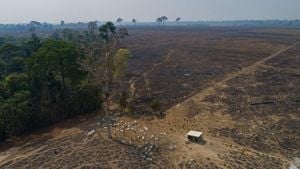President Donald Trump has once again positioned the United States at the center of one of the world's most contentious geopolitical issues: the Gaza Strip. During a pivotal meeting with Jordan's King Abdullah II at the White House on February 11, 2025, Trump reiterated his intention for the U.S. to take control of Gaza, raising eyebrows and sparking widespread criticism.
Approaching the topic with palpable confidence, Trump boldly stated, "We're going to take it. We're going to hold it. We're going to cherish it." This declaration is part of his broader proposal to remove nearly two million Palestinians from Gaza, aiming to relocate them to neighboring countries, including Jordan and Egypt. While Trump painted this plan as beneficial, envisioning Gaza transformed "into the Riviera of the Middle East," it has been met with outrage across the Arab world.
Jordan, already home to millions of Palestinians, firmly rejected the idea of forcibly relocating more. King Abdullah, during the joint press availability, stressed Jordan's "steadfast position against the displacement of Palestinians" and underscored the unified Arab stance on the matter. "Rebuilding Gaza without displacing the Palestinians should be the priority for all," he stated, conveying the deep-seated concerns shared by many leaders in the region.
While Abdullah did express willingness to accept around 2,000 sick Palestinian children requiring medical treatment, he was careful to avoid endorsing Trump's broader relocation plan. This measured response showcased the tension between Trump's ambitious objectives and the realities faced by leaders like Abdullah, who grapple with very real domestic issues linked to Palestinian demographics.
Trump's comments during the press conference have not been conducive to building consensus, particularly when he remarked, "I believe we'll have a parcel of land in Jordan. I believe we'll have a parcel of land in Egypt," pervading the narrative with pressure on these nations to accept more refugees. Both countries have already been strained by large populations of displaced individuals from previous conflicts.
Despite Trump's assertions of creating jobs and enhancing the region's economic prospects through development, the Arab nations remain staunchly opposed to any notion of forced displacement. The proposal not only contradicts decades of U.S. foreign policy but could also violate international laws prohibiting the forcible transfer of populations. The specter of ethnic cleansing has loomed large over discussions of resettlement.
The ramifications of such proposals could strain U.S.-Arab relations, especially as Trump previously hinted at withholding financial aid to Jordan and Egypt to compel them to accept more refugees. "I don’t have to threaten [aid], I think we’re above [that]," the president claimed, yet his past statements suggested otherwise.
The Palestinian issue is not just political; it is deeply personal for those involved. Many Jordanians have familial ties to Palestinians, and the potential influx of new refugees raises complex questions about national identity and resource allocation. "This is not just about economics or security for Jordan; it’s about our identity," reflected former Jordanian foreign minister Marwan Muasher.
Public opinion within Arab nations is overwhelmingly against Trump's Gaza plan. A recent poll indicated significant opposition, with three out of four Americans querying the proposal echoing sentiments found within regional populations. The discussions surrounding the Gaza Strip are colored by historical grievances and the collective memory of displacement during the creation of Israel.
Further complicity arises from the fragile ceasefire currently holding between Israel and Hamas. Trump has suggested he could cancel this ceasefire if all hostages are not released by the militant group by the weekend's deadline. This approach is indicative of the real pressure and potential volatility the administration is willing to navigate.
While Trump's ambitions for redeveloping Gaza could resonate with some segments of political thought, they overlook the potential human cost and regional stability. Abdullah’s efforts to navigate this delicate discourse, flanked by his quiet resistance to Trump's more audacious claims, exemplify the challenges Arab leaders face amid changing U.S. policies.
The forthcoming Arab-led plan spearheaded by Egypt seeks to address the humanitarian crisis without compromising the rights of Palestinians to their homeland. The Jordanian king indicated proposed discussions on this plan, but it remains clear the groundwork must be delicately laid, ensuring it is responsive to both local and international demands for justice and dignity for the Palestinian people.
Trump's commitment to this deal and his confident declarations signal a departure from traditional negotiations, replacing diplomacy with what seems akin to real estate transactions. Yet, ordinary lives are interwoven within these geopolitical calculations, leaving many wondering whether such ambitious plans can ever pivot toward stability and peace.
King Abdullah's diplomatic ballet provides some optimism against the backdrop of what Trump envisions for Gaza. His articulations reflect wider Arab desires: rebuilding efforts centered on rights to land and sovereignty without external coercion. Navigated carefully, this charge could lead to resolutions grounded not just in economic benefit but also justice and historical rectitude.
Above all, the fundamental issues involved extend beyond political machinations— they tap directly at the heart of identity, legacy, and dignity for millions caught within the tumult of decades of strife. It remains to be seen whether these discussions could pivot toward not just dialogue, but real solutions benefiting both the Palestinian people and regional allies, who bear the weight of these international debates.



